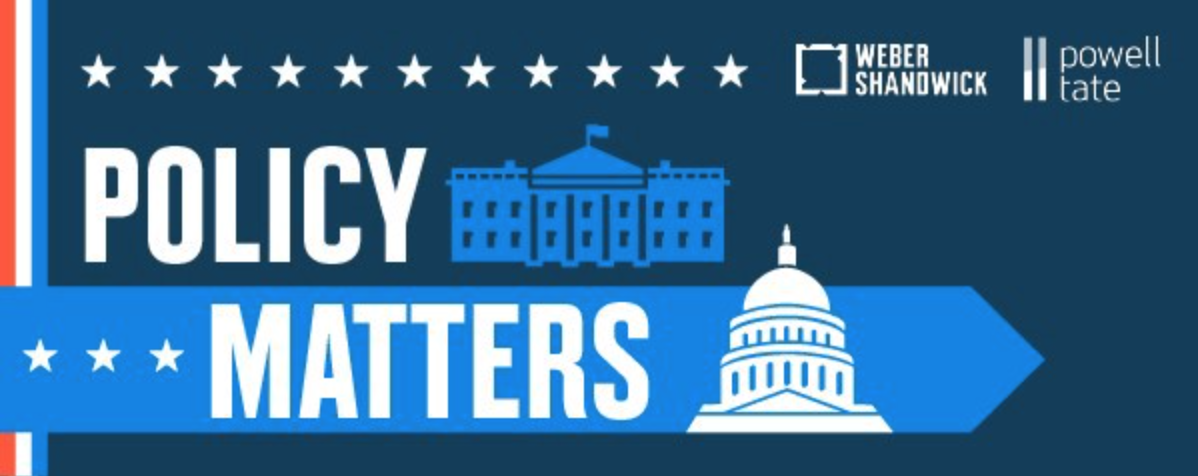
Sign up for Powell Tate Insights for monthly fresh takes on disruptions, innovations and impact in public affairs.
We cover hot issues on Capitol Hill, share progress made on the Biden-Harris Administration’s agenda and a look-ahead at issues to watch. We closely follow the overarching areas animating much of U.S. policy: response to the pandemic, the economy, equity, climate and technology.


President Biden addressed the nation on Monday about the deadly withdrawal of U.S. personnel from Afghanistan and the swift Taliban takeover of the country. Standing by his decision, he said, “I am president of the United States of America, and the buck stops with me,” adding: “I am deeply saddened by the facts we now face, but I do not regret my decision.”
Chaos in the wake of the Afghan government’s collapse marks a serious test of the Biden-Harris Administration, with sharp criticism from many Republicans and some Democrats.
Biden is the fourth American president to grapple with security and political strife in Afghanistan. The U.S. government has authorized trillions of dollars in aid and military spending. In the last 20 years, tens of thousands of American soldiers, U.S. contractors, aid workers and journalists have been killed or wounded there.
The Afghan dissolution — as well as the emerging humanitarian disaster in Haiti — comes during a Congressional recess, when lawmakers return to their home states and districts to engage constituents, host town halls and for many, strategize reelection plans with their campaign teams.
The House and Senate will return for a hectic fall, with pressing priorities to tackle — including defense funding amid growing national security concerns — before the challenges created by the 2022 midterm elections intervene. And narrow majorities in both chambers complicate Democrats’ ability to deliver on the Biden-Harris agenda.
The following are key legislative and policy updates and developments to watch:
The U.S. economy continues to experience promising signs of recovery, including 6.5 percent growth in the second quarter and the addition of
943,000 jobs in July.
THE NEVER-ENDING ‘INFRASTRUCTURE WEEK’
A bipartisan group of senators negotiated a $1.2 trillion infrastructure package, which passed August 10 in a vote of 69–30. The bill includes $550 billion in new federal infrastructure investment to help rebuild, restore and make more resilient America’s roads and bridges, passenger rail, public transit, drinking water infrastructure and broadband internet access. The bill’s road in the House will not be a smooth one. Speaker Pelosi has vowed the chamber will not vote on the bipartisan bill until after Senate passage of the $3.5 trillion budget reconciliation bill adopting much of President Biden’s economic and social agenda, garnering progressives’ support.
ECONOMIC RECOVERY CHALLENGES
The U.S. economy continues to experience promising signs of recovery, including 6.5 percent growth in the second quarter and the addition of 943,000 jobs in July. While the Biden-Harris Administration’s economic advisors and many Congressional Democrats support continued federal spending — including on infrastructure, jobs and social programs — to boost the recovery and “Build Back Better,” strong headwinds remain, including inflation and sluggish hiring in key sectors. Debate looks tense in Congress over raising the debt ceiling — the nation’s credit limit. A failure to do so, likely by October or November, risks the U.S. defaulting on its debts. Forty-six Senate Republicans have signed a pledge not to raise the debt ceiling to accommodate Democrats’ “massive and unprecedented deficit spending spree.”
NEXT STOP — RECONCILIATION
To unlock the budget reconciliation process Democrats plan to use to bypass the Senate’s 60-vote threshold and filibuster rules, Senate Majority Leader Chuck Schumer (D-N.Y.) and Senate Budget Committee Chair Bernie Sanders (D-Vt.) put forth a $3.5 trillion dollar resolution to serve as their roadmap. Senate Democrats passed the budget resolution and House members will return on August 23 to vote on it. Some moderate Democrats are threatening to withhold support unless the House first passes the bipartisan infrastructure bill. The details of the reconciliation package will be finalized and advanced by congressional committees this fall.
DELTA VARIANT SURGES
The Biden-Harris Administration, federal, state and local policymakers continue to navigate surges in COVID-19 cases due to the Delta variant. Recent changes to CDC Mask Guidance have reignited debate on public health measures as well as strategies for incentivizing vaccinations, resulting in strong backlash from some Republican lawmakers, including in the states. The administration also announced a plans for booster shots; questions about the equity and the ethics of boosters grow as so many around the world remain without a first dose.
DEMOCRATS WEIGH HEALTH CARE REFORMS
With Obamacare surviving its third Supreme Court challenge in June and progress on COVID-19 vaccinations, policymakers are focused on the future of federal health policy. The budget resolution and corresponding reconciliation package hold the potential for significant — and more controversial — health provisions. But even with a $3.5 trillion price tag, Democrats have indicated there won’t be enough funding to cover all of the party’s health policy priorities. Expansion of Medicaid in holdout states and the addition of dental, vision and hearing benefits to Medicare are likely to be included, but some policies, such as lowering the eligibility age for Medicare, may not make the cut.
DRUG PRICING REFORMS UP FOR DEBATE
Other high-priority issues such as substantive prescription drug pricing reform remain on the table as an option to fund new health spending. How those proposals solidify is still the subject of intense debate. The Senate Finance Committee continues to work on an alternative to the House’s Lower Drug Costs Now Act, which would give Medicare the authority to negotiate drug prices; President Biden voiced support. Republican lawmakers — and many moderates — strongly oppose these proposals.
…(T)he world will cross the crucial 1.5 degrees Celsius temperature threshold
as early as 2030 — up to a decade sooner than previously thought.
CLIMATE FUNDING ON THE WAY
The $1+ trillion infrastructure bill passed by the Senate includes $73 billion to update the U.S. electric grid, $50 billion to bolster infrastructure against cyberattacks and climate change and $7.5 billion for electric vehicle charging stations. Next, Democrats will consider climate provisions in the $3.5 trillion budget reconciliation bill.
ALARMING NEW CLIMATE REPORT
A sweeping United Nations-sponsored review of climate science projected that the world will cross the crucial 1.5 degrees Celsius temperature threshold as early as 2030 — up to a decade sooner than previously thought. The warning from the Intergovernmental Panel on Climate Change (IPCC) will give new urgency to the Biden-Harris Administration to advance its ambitious climate agenda.
ZERO-EMISSION VEHICLES
President Biden signed an executive order that sets a new target to make half of all new vehicles sold in 2030 zero-emissions vehicles, including battery electric, plug-in hybrid electric or fuel cell electric vehicles. The 50 percent target, which is not legally binding, won the support of U.S. and foreign automakers, who said that achieving the target would require billions of dollars in government funding.
VOTING REFORM HITS A SNAG
While Republicans seek to enact restrictive voting laws in states across the nation and block voting reform legislation at the federal level, the U.S. Department of Justice (DOJ) is using executive branch powers to advance voting rights. Sen. Amy Klobuchar (D-Minn.) and a small group of Democratic senators may soon announce a revised, scaled-back Senate bill with hope for bipartisan support after earlier attempts came up short. Majority Leader Schumer signaled the new proposal would be the chamber’s first priority upon return from recess. House leaders have also scheduled a vote on the John Lewis Voting Rights Act next week.
POLICE REFORM IS ALL IN THE DETAILS
Democrats in the House passed the George Floyd Justice in Policing Act in early March, but the bill immediately confronted an uphill battle in the Senate. In late June, Sens. Tim Scott (R-S.C.) and Cory Booker (D-N.J.) and Rep. Karen Bass (D-Calif.) announced a tentative bipartisan deal on criminal justice and police accountability but negotiations continue. One of the main points of contention — changes to qualified immunity — may be taken off the table in an attempt to make progress.
THE SPREAD OF HEALTH MISINFORMATION
Sens. Klobuchar and Ben Ray Luján (D-N.M.) introduced legislation to limit legal protections under the Communications Decency Act’s Section 230 in order to hold online platforms accountable for the spread of vaccine and other health-related misinformation during public health emergencies. Without Republican buy-in, the bill has limited chance of passage but it signals Democrats are not backing down from pressing tech companies to address COVID-19 misinformation.
TOUGH ANTITRUST ENFORCEMENT FOR U.S. TECH
By lining up prominent tech critics for antitrust enforcement roles — including Lina Khan, new chair of the Federal Trade Commission (FTC) and Jonathan Kanter, nominated to lead the DOJ’s Antitrust Division — the Biden-Harris Administration is sending a message it is serious about reining in U.S. tech companies’ power. Despite growing bipartisan support to regulate tech companies, Democrats and Republicans are not aligned on a strategy and each side has different priorities. Passage of legislation, including two recent antitrust bills from the House, will not be easy. Meanwhile, the FTC plans to refile its historic complaint against Facebook for anticompetitive behavior.
RANSOMWARE AS NATIONAL SECURITY THREAT
The DOJ gave ransomware attacks priority comparable to terrorism following a series of high-profile attacks that disrupted nearly half the East Coast’s fuel supply and threatened the nation’s largest meat supplier, among others. New bipartisan bills would require mandatory reporting of cybersecurity incidents within 24 hours to the Department of Homeland Security (DHS) by certain critical parties and impose sanctions on foreign nations that harbor hackers. The U.S. government is also enlisting the help of tech companies to protect cloud providers from these attacks and improve information sharing between the government and private sector to more easily spot and combat threats.

Author
Carolyn develops and manages public affairs, integrated communications and public education campaigns.
Sign up for Powell Tate Insights for monthly fresh takes on disruptions, innovations and impact in public affairs.
Managing risk & reputation in an election year
Throughout the course of the 2024 election cycle, our Global Elections Task Force has been providing data-driven election insights, analysis, and real-time counsel to our team and clients. Get timely insights on our Election Matters home page.